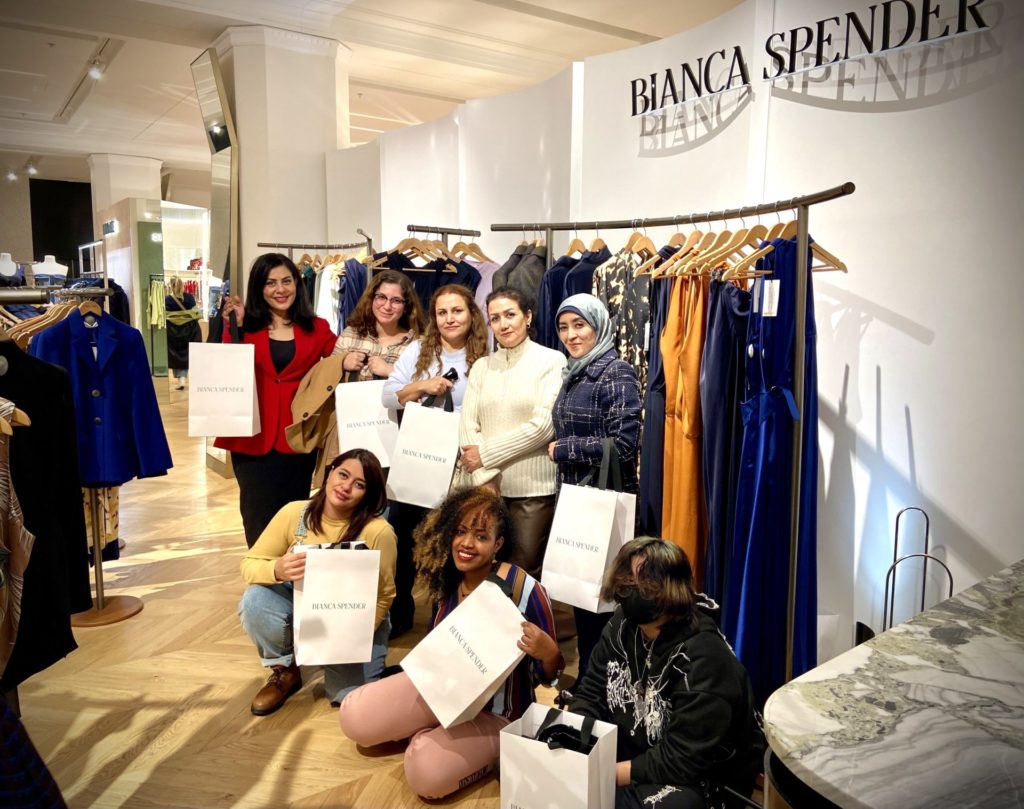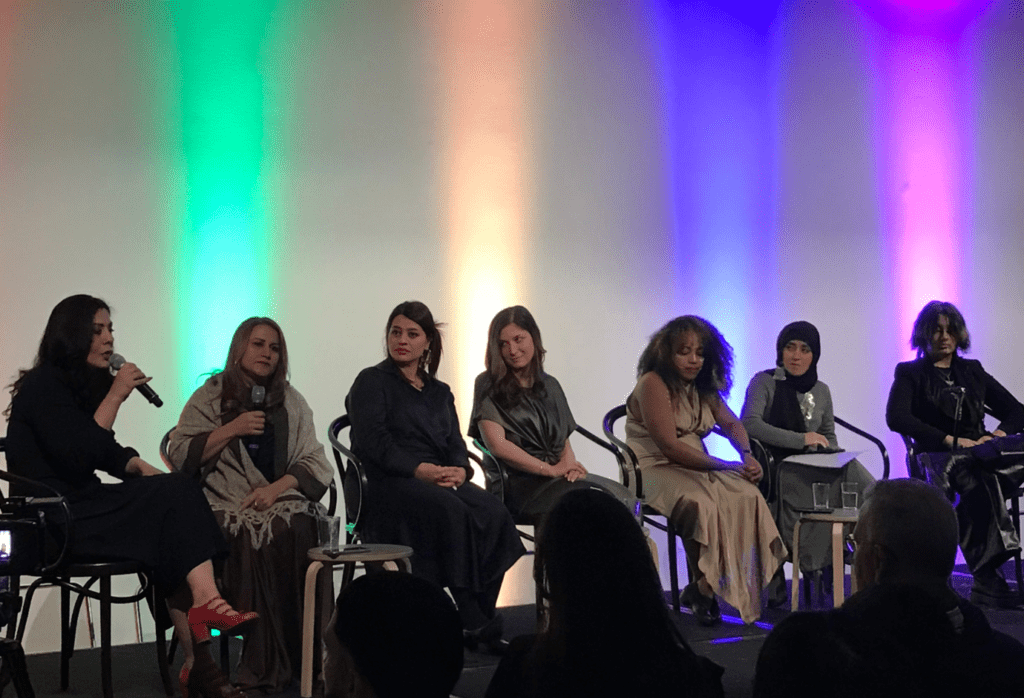Female and non binary refugees and migrants face significant discrimination when it comes to employment and housing, social and economic participation, Senator Mehreen Faruqi said on Wednesday night, at Nauru Narratives: Writing in Resistance event.
And so often, essential voices, stories and trauma are often drowned out.
Speaking at the NSW Art Gallery for The Red Room’s event, as part of Refugee Week, Senator Faruqi was joined by the program’s creator Dr Saba Vasefi, along with its six participants: Narges Alizadeh, Mastaneh Azarnia, Yasaman Bagheri, Fazileh Mansour Beigi, Rev Ghanaei and Betelhem Zekele — to hear directly from these poets who have fled their countries.

The poets each performed one poem from their canon, illustrating their work as part of the Writing In Resistance initiative, which was created last year by Dr Vasefi, with the aim to support women and non-binary emerging writers to use poetry as a way to defy violence, gendered racism and intersecting forms of discrimination.
“I’m really grateful for their courage and willingness to share their deeply personal experiences and stories with us,” Senator Faruqi said of the poets, who have all spent years inside Australia’s asylum centres on Nauru.

Photo Credit: Tawfik with ‘© tawfik elgazzar
“Some of these inspiring individuals from Ethiopia, Afghanistan and Iran, use poetry to defy violence, genuine racism, and intersecting forms of discrimination.”
“It is a real privilege to be here during refugee week, celebrating and amplifying the voices of female and non binary survivors of Australia’s inhumane offshore detention regime brought together by poetry’s Writing in Resistance project.”
Dr Vasefi, a journalist, academic and poet, said the project arose out of her reporting as a scholar journalist on refugee women who arrived in Australia by boat in 2013 and were forcibly transferred by authorities.
“The project provides a public space, a publishing platform and paid commissioning opportunities for aspiring poets and creatives for women and non binary emerging writers to use poetry as a way to defy violence, gender racism, and intersecting forms of discrimination,” she said.
“We want to recognise and validate the poet’s humanity, and to celebrate their voices. They are human. We are committed to providing opportunities for emerging poets, especially those who face barriers to creative opportunity.”
The poets, who wore clothing specifically designed for them for the evening’s event by Australian designer, Bianca Spender, elaborated on the reasons why poetry was so important to their survival and creative endeavours.

Photo Credit: Tawfik with ‘© tawfik elgazzar
“This is my family,” Betelhem Zekele said. “We’ve been in years of detention. Poetry shows us, tells our history. It’s a good chance to start and share our feelings for all of you because if we didn’t speak loudly, we can’t solve anything. I’m happy to come here to share my history.”
Yasaman Bagheri said while she was fleeing her country, she wrote on her tent one night, “This too shall pass.”
“Writing is the least restrictive medium of art,” she said. “For years, inside the detention centre, I didn’t hold cutlery – because it was seen as a weapon. Just to have something so simple taken away and still be able to write. It is freeing.”
Mastaneh Azarnia agreed, adding, “Writing and painting were the only ways I could express my feelings. I have hope to regain all those things that have been taken away from me.”
For Rev Ghanaei, an 18-year old transgender artist, creativity runs through his blood.
“It’s always been a big deal to me, being a trans guy. Nothing, nowhere has felt like home. Only poems and drawings make me feel like I’m home. I know it’s not fair. There’s not a lot of trans people out there. It’s a hard experience, where people accept you without being judged.”
Narges Alizadeh said though she was not formally educated, Dr Vasefi had encouraged her to write.
“Writing helps me release my pain,” she said. “It’s the only thing we can do. Writing has helped me to speak out, I feel like people can hear me.”
The Poets, and their Poems (extracts only)
Narges Alizadeh, Hazara-Afghan refugee “Indefinite Displacement”
“No time to wait for a marvel,
I write to my dreams
to come true
and take me
to the nursing class
where I’m entitled to traverse
the learning roads
and extrude
the route of displacement.”
Betelhem Zekele, Ethiopian refugee “Shattered Mirror”
“Flattened by lethal forces
my unarmed aspirations are shot
my spirit is sank
my flesh is apprehended
my identity is shattered.
Violation and isolation stalk me
from Ethiopia to Australia.”
Mastaneh Azarnia, Iranian refugee “Separation borders”
“Iran forced me to forget you
as I was valued half of a man
a mother without custody rights,
Australia implores amnesia of myself
as I am an unsanctioned wanderer
who passed the patriarchal borders
unaccompanied by permit
nowhere the law applies to me.”
Yasaman Bagheri, Iranian refugee, “Drowned on Shore”
“The mothers and fathers,
one hand raised to pray,
the other on their children’s shoulders.
The wave was a dreadful death
rolling towards us;
towards us, whose shore was not our home.
Either the generous sea
embraced us—the banished—
and we could die from suffocation
or perish later from withdrawal syndrome
in a mouldy tent.”
Fazileh Mansour Beigi, Iranian refugee, “I Have Not Found the Key”
“In the camp, I became a number
in the court, I remained a number
I always said if any harm befell my children,
I would not remain silent.
Where hope does not exist
the pen can stitch us to life.
I write not as a number
or a woman defeated
but in resistance.”
Rev Ghanaei, Iranian refugee, “Binary Borders”
“A day that is not
dim
misty
clouded
and all of my stabbed
drawings
are stitched and cured.
When we are not divided
in the binary borders of
your indifference
and my deprivation.”
Senator Faruqi ended the night by repeating her call to continue fighting for refugee rights.
“I will keep fighting for a fair and humane immigration system and offshore detention and closing the camps and lifting Australia’s intake of refugees,” she said.
“Refugees and migrants who come here to make this place home should get the support they need to find their feet, settled to work and study and have certainty for a pathway to permanent residency.”
Find out more about the Writing in Resistance program here.


